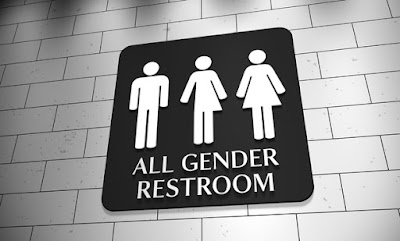Restroom Rules: Where Do We Go From Here?
This past May, in a joint
letter from the U.S. Department of Justice Civil Rights Division and the
U.S. Department of Education Office of Civil Rights, the Federal government
clarified for educators what schools must do to ensure the civil rights of
transgendered students. The letter served not to make changes to the law but
rather to clarify that the civil rights of transgender students are covered
under Title IX of
the Educational Amendments of 1972. The letter was accompanied by a report that
provided several example
policies and emerging practices for supporting transgender students. These
example policies addressed student transitions; privacy, confidentiality, and student
records; sex-segregated activities and facilities; and additional practices to
support transgender students.
Of the policy recommendations, none
came with more debate from the American public this summer than restroom rules.
When it comes to restrooms and locker rooms, according to the letter, “A school
may provide separate facilities on the basis of sex, but must allow transgender
students access to such facilities consistent with their gender identity.” This
statement brought about debate over privacy concerns for all students in school
bathrooms.
In its accompanying policy example
document, the Federal government highlighted transgender restroom policies from
Washington State, Washoe County, and the Anchorage Schools. It was noted the
“some schools have policies that students must be permitted to access
facilities consistent with their gender identity and not be required to use
facilities inconsistent with their gender identify or alternative facilities.”
Fast forward three months after these policy
recommendations were released, and as Mark Walsh of Education Week reports in this
recent article, the debate over restroom rules is now playing out in the court
systems, and this leaves uncertainty for educators and school leaders as
millions and millions of students return to school this fall. In late August, a
federal judge in Texas issued an order that temporarily blocks restroom regulation
of the basis of gender identity. In his ruling, U.S. District Judge Reed O’Connor said the Obama
administration failed to comply with federal rule-making procedures in
violation of the Administrative
Procedures Act. This ruling sided with thirteen states who sued the
government over its May 13 letter, arguing that it overstepped federal authority
and misinterpreted Title VII and Title IX, which bar sex discrimination in
employment and education.
In Gloucester County, VA, in early August,
the federal court blocked an injunction won by 17-year-old transgender student Gavin
Grimm who was seeking to use the boys’ restroom at his high school. The school
later won the case because, as Walsh wrote, “Justice Stephen G. Breyer joined
with the court's four-member conservative bloc as "a courtesy," as he
put it in a concurrence, to preserve the status quo and because the court was
on its summer recess.”
Legal
experts have acknowledged that this stay harms Grimm who has mostly refused to
use the separate, single-occupancy restroom that school authorities have asked
him to use. He must now return to school this fall under humiliating
circumstances.
As the
school year starts, where does this leave school administrators who must
develop policies to uphold the civil rights of all students for bathroom use?
Walsh went on to write, “Derek W. Black, a law professor at the University of
South Carolina who specializes in education law, said he was surprised by the
Supreme Court's stay in the Gloucester County case, given how much other
litigation is percolating about transgender students in schools. ‘Maybe with
this stay, the court is just pressing the pause button for schools on this
issue,’ Black said.” Many argue we can’t afford to be on pause. The May 13
joint letter was meant to move schools forward so that students like Grimm would
have the equal opportunities that they deserve. Alas, the debate continues.




Comments
Post a Comment